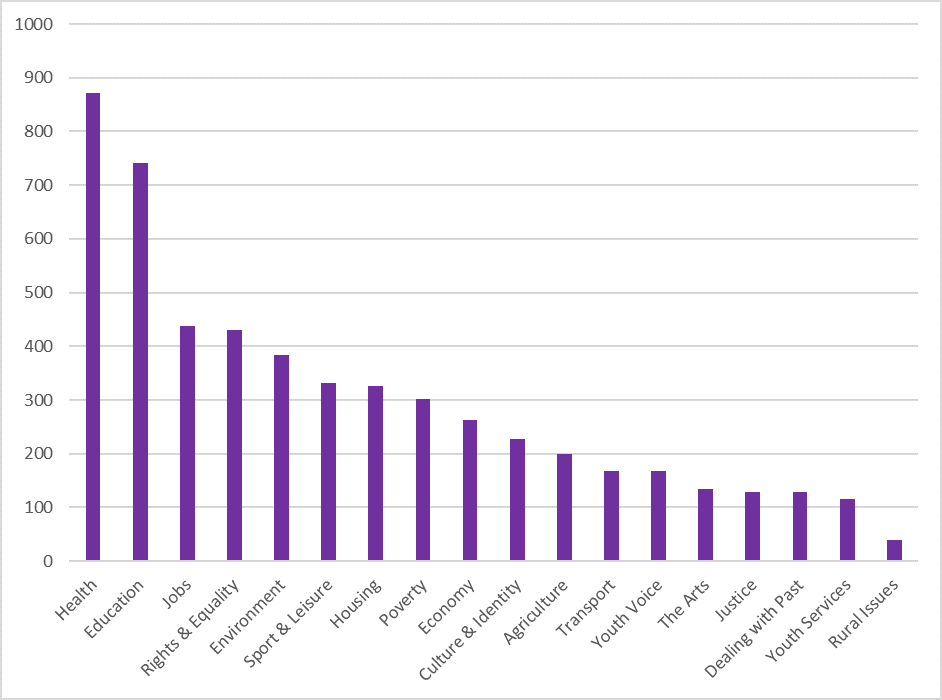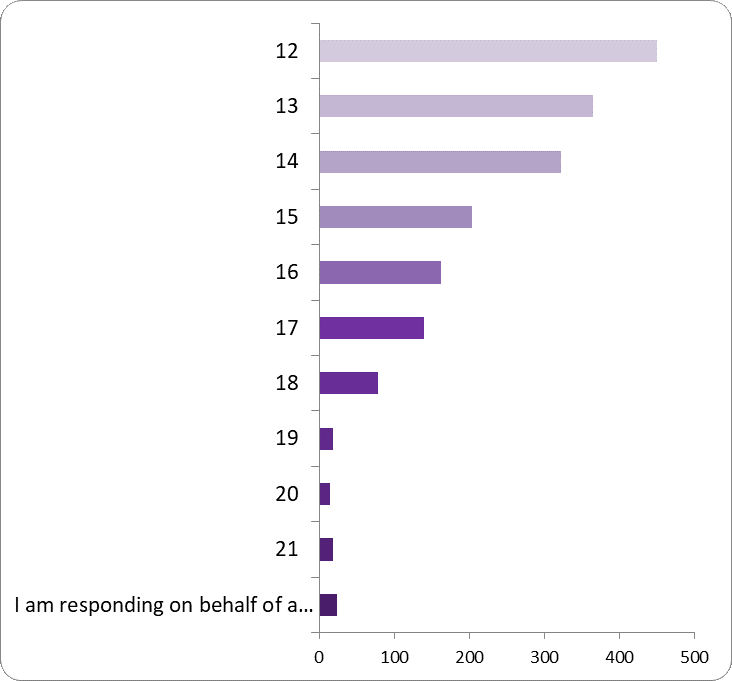January 2024
This report summarises the views of the young people who completed the Youth Assembly’s ‘Big Youth Survey’ in January 2024. The survey was designed to help new Youth Assembly Members identify and decide which issues to focus on during their mandate.
The online survey was aimed at all young people aged 12-21 in Northern Ireland. The survey was sent to Youth Assembly Members, the Youth Assembly Consultation Forum, MLAs, the Speaker’s Advisory Group and every post-primary school and college in Northern Ireland. In addition, it was promoted widely through youth networks and the Youth Assembly’s social media channels. It was live for the period 8 January to 26 January 2024.
Young people chose their top three issues from a list of 18 which were suggested by Youth Assembly Members at their first meeting in December 2023. In addition, young people were able to add an issue if it wasn’t on the list. They were also given the chance to explain why they chose the issues they did.
The 18 issues (in alphabetical order) were:
In total, 1,798 survey responses were received from young people across Northern Ireland. This is an 89% increase on the 2021 survey carried out for the last Youth Assembly mandate which was completed by 951 young people.
Based on the responses, the rank order of the issues is as follows:
| Rank | Topics | Number of respondents who selected this as one of their top three preferences | Percentage share of votes (rounded to nearest whole number) |
|---|---|---|---|
| 1 | Health | 871 | 16% |
| 2 | Education | 742 | 14% |
| 3 | Jobs | 437 | 8% |
| 4 | Rights & Equality | 431 | 8% |
| 5 | Environment | 383 | 7% |
| 6 | Sport & Leisure | 332 | 6% |
| 7 | Housing and Homelessness | 327 | 6% |
| 8 | Poverty | 301 | 6% |
| 9 | Economy | 263 | 5% |
| 10 | Culture & Identity | 227 | 4% |
| 11 | Agriculture | 199 | 4% |
| 12 | Transport | 168 | 3% |
| 13 | Youth Voice | 167 | 3% |
| 14 | The Arts | 135 | 3% |
| 15 | Justice | 129 | 2% |
| 16 | Dealing with the Past | 128 | 2% |
| 17 | Youth Services | 115 | 2% |
| 18 | Rural Issues | 39 | 1% |

| Age | Percent |
|---|---|
| 12 | 25.08% |
| 13 | 20.30% |
| 14 | 17.91% |
| 15 | 11.35% |
| 16 | 9.07% |
| 17 | 7.79% |
| 18 | 4.34% |
| 19 | 1.00% |
| 20 | 0.83% |
| 21 | 1.00% |
| I am responding on behalf of a young person | 1.33% |

Those who completed the survey were given the opportunity to explain why they had chosen particular issues and why it is important for the Youth Assembly to focus on them. Responses were anonymous. All comments were read, considered and are reflected in the summary below.
Please note that the comments and themes identified are those of the respondents and may represent the view of only one individual. In addition, they do not represent the views of the Youth Assembly.
In the following summary, comments on each of the issues are grouped thematically. Issues are presented in alphabetical order.
Lack of funding and recognition for farmers.
Concerns for the future of farming.
Health of farmers.
Lack of funding and recognition.
Benefits of involvement in the arts.
Lack of opportunities to get involved (too costly).
Language and culture e.g. Ulster Scots and Irish.
Greater role for education.
Religion – lack of curriculum.
Racism and hate crime on the rise.
LGBTQ+ identity – greater support.
Understanding the past.
Victims need to be heard.
Education needed around the troubles.
Cost of living crisis.
Effect of economy on other issues.
Worries for the future.
Education around economy for young people.
Curriculum reform needed.
Homework stress.
Impact of strikes.
Support for young carers, those children with additional needs and for the mental health of all students.
Funding for schools.
Need to feel prepared for adult life.
Mental health.
Transfer test.
Cost of education (school uniform, free school meals, university fees).
Pupils need to have a say.
Awareness and education in environmental citizenship.
Climate anxiety.
Natural world – animals in danger, local environment at risk e.g. Lough Neagh.
Pollution – litter, smoke, recycling.
Governments and large companies do not take this seriously.
Mental health – not taken seriously, impact of social media, pressure at school, lack of services, impact on young carers.
NHS – funding, access to services, waiting lists.
Physical health – vaping, obesity, access to period products, fast food.
Rising cost of housing.
Cost of living.
Homelessness – rising numbers, impact on children, stigma.
Careers advice – need it younger, need to be better quality.
Challenges – no part time jobs, low rates of pay, discrimination.
Low salaries – cost of living, public sector pay, poor salaries compared to rest of UK.
Fairness – reform of justice system needed, takes too long.
Restorative justice programmes need to be expanded.
Tougher sentences for more serious crimes.
Impact – hidden issue with lots of associated problems e.g. lack of educational attainment, criminality, poor housing.
Action needed by government e.g. cost of school meals, uniform, lack of Education Maintenance Allowance (EMA), homeless shelters and more food banks.
Age – Children need to be involved in the decisions that are made for them.
Race – hate crimes, discrimination and racial slurs are common.
Gender – pay disparity.
Disability – everyone deserves to be equal and feel valued in society.
Sexuality – rights of LGBTQ+ youth.
Need for education around other cultures and identities and children’s rights.
Poor access to services e.g. hospitals, banks, leisure activities.
Rural areas underfunded.
Farming underfunded.
Education – schools closed or amalgamated.
Transport – road network and quality of roads are poor.
Not enough facilities overall for young people.
School – better variety of sports and access for all.
Accessibility – public transport expensive, unreliable and not accessible by all.
Cost e.g. travel to school should be free for all.
Safety – too many on some buses, lack of night buses.
Climate impact – better public transport = less reliance on cars = less carbon emissions/more sustainable overall.
Trains – need to improve railway infrastructure.
Rural areas – lack of transport and infrastructure in rural areas which limits opportunities.
We need accessible and well-funded youth services for all young people.
More services for young carers.
Support for young people with disabilities.
More activities for those aged 18-25.
Well-resourced youth services bring many benefits – sense of belonging, lower rates of crime, boosts confidence and skills, better mental health, job opportunities and life skills.
Local Government and Northern Ireland Assembly – young people need to have a say on decisions made for them.
No-one seems to listen to teenagers.
Young people are ignored in government issues and when we are, it is a token placement and has no meaning.
Schools – Pupils’ voices should be heard.
Voting – Many young people feel that their vote doesn’t matter.
The Youth Assembly would like to thank everyone who took the time to complete the survey and share their lived experience, perspectives and opinions. Thanks also to those young people and adults in schools, colleges and throughout the youth sector who helped to share the survey with their networks. A further thanks to the individuals, organisations and representatives who helped to amplify the survey by sharing our posts on social media.
The survey results will be published on CitizenSpace once the survey closes.
This summary report will help Youth Assembly Members plan for their next plenary, on Saturday 24 February 2024 during which Members will debate and vote on their priorities for the mandate.
The Youth Assembly Committees will be established after the plenary and will be based on the issues voted on by the Youth Assembly Members in plenary.